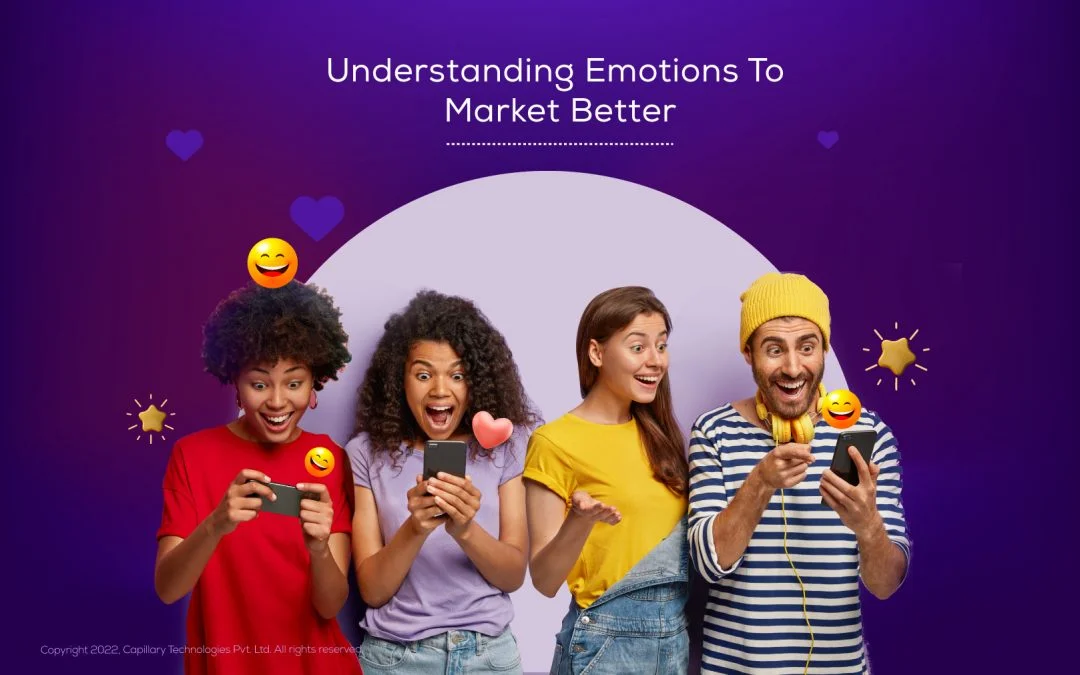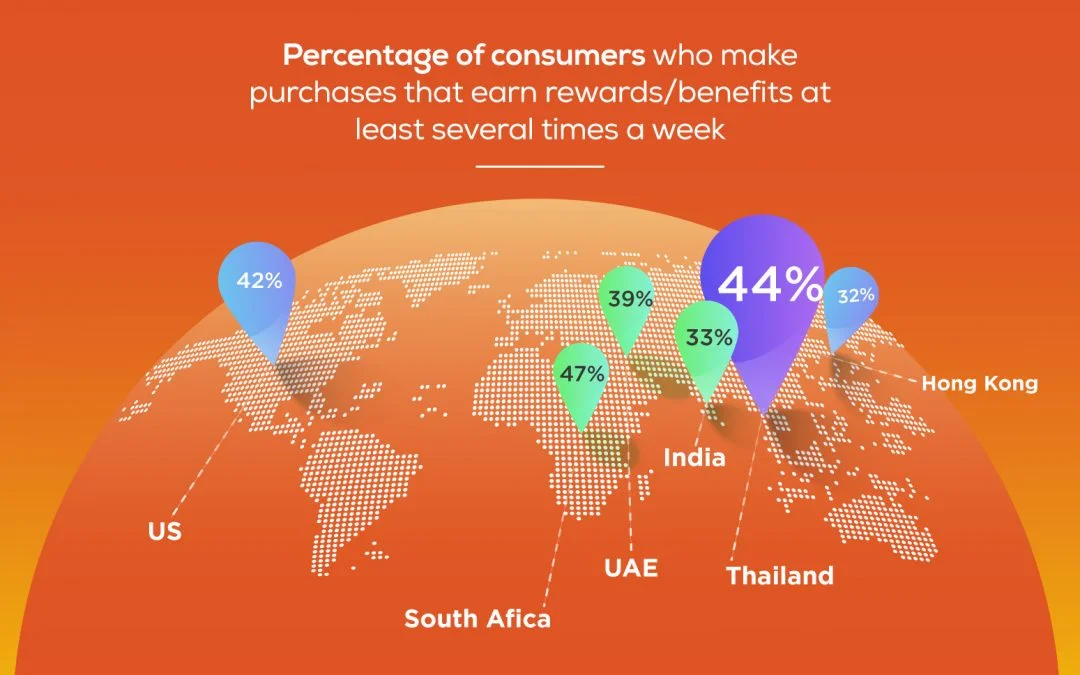- Design industry shaping loyalty programs
- Integrate easily and go live quicker
- Deliver hyper-personalized consumer experiences
Blue Rewards from Al Futtaim Group Shares Loyalty Success Stories and Evolution. Watch Podcast >
Capillary Triumphs with 4 Prestigious Wins at the 2025 International Loyalty Awards! Read more >

When dealing with people, remember you are not dealing with creatures of logic, but creatures of emotion.
– Dale Carnegie
With increasing competition, brands must effectively utilize the crucial concept of emotional loyalty, to form positive emotional connections and enhance customer relations. Psychological preferences, personalized experiences & the values that brands stand for – are becoming crucial for customers.
Successful loyalty programs cannot just rely solely on rational loyalty, also known as transactional loyalty, as this will not build strong long-term relationships with customers. Customers need more than quality products, discounts, and rewards to keep going with a certain brand.
It’s the right balance of emotional & rational approach that can work well for any business. Going further in this blog, you will learn how emotional loyalty supports common types of loyalty & aids in customer retention.
Rational loyalty is when customers remain loyal to a certain brand they are shopping from for the monetary rewards they are getting instead of long-term associations. Individuals accrue benefits here based on transactional exchanges, and they remain loyal to the brand as long as they don’t find the best deals elsewhere.
Here’s an example, let us consider a customer who shops grocery items for 5000INR/month from DMart and gets 500INR off from the bill in addition to discounted rates of products. If a grocery store in their vicinity offers a flat 50% discount to their first-time shoppers, they may prefer shopping once from there to claim that deal. You can see it’s purely a rational decision, and that’s why it is also known by the names – transactional loyalty, functional loyalty, or cognitive loyalty.
One of the rare yet most intriguing loyalties that brands crave is an emotional one. It is driven by the psychological preferences of customers & their shopping experiences. Though it’s a long and uncertain process, emotionally bonded customers have demonstrated greater conversions. According to a study published by Harvard Business School, 95% of our purchase decisions occur subconsciously.
Let’s try to visualize emotional loyalty with an example. Imagine a tourist exploring a new city. After a long day of sightseeing, he feels drained and craves a coffee and sighs “Phew, I badly need a coffee, is there a Starbucks nearby?”
That sums up emotional loyalty – it’s a fast and almost instantaneous positive preference for a brand with zero rational or logical deliberations. Unsurprisingly, Starbucks also has one of the best loyalty programs in the F&B space.
A customer feels an affinity for a brand when they deliver great goods and the branding matches their lifestyle. It’s important not to confuse ‘Affinity’ with ‘Loyalty’ . A customer might feel an affinity for a brand but it doesn’t mean he/she will be loyal to it. In a sense, ‘Affinity’ lies closer to ‘Preference’ or ‘Liking’. For instance, customers who only have an affinity for a brand will easily switch to a competitor with a better product or lower price.
As the name implies, ‘Attachment’ implies a connection to a brand. A large part of attachment is tied to how a company engages with customers. Make the effort to build meaningful connections through highly personalized communications that are relevant and useful to the customer to strengthen this aspect of emotional loyalty. Another great way to improve the brand attachment quotient is by rewarding engagement, in addition to transactions, and recognizing premium customers with exclusive benefits and acknowledging their status in every communication.
Trust is the most important element in emotional branding strategies. It’s essentially the framework on which Affinity and Attachment are built upon. Brand communication and customer engagement are critical in establishing trust. To create a sense of trust, offer authenticity, great support, timely communications, respect for customer privacy and ability to provide feedback.
Marketers typically track behavioral loyalty metrics like conversion rates, customer value, basket size to gauge the effectiveness of a loyalty program. However, it’s equally important to analyze emotional loyalty metrics that gauge intent, sentiment, perceptions, and customer experience :
Envisioned by Fred Reichheld of Bain & Company and Satmetrix Systems, NPS measures customer responses to the famed single question: “How likely is it that you would recommend our company/product/service to a friend or colleague?”. It is a highly popular framework due to its simplistic nature and how the score calculations are clearly defined. However, that simplicity can often hide the root of the problem. For instance, brands with very dissimilar distribution of Detractors, Passives & Promoters could arrive at the same NPS score. Therefore, NPS scores should always be used in conjunction with other Customer Experience metrics and business results.
Tracking customer satisfaction levels through simple surveys can offer brands a sense of how customers perceive the brand. These informal surveys allow marketers greater freedom in tackling specific issues and reporting them. Granted that they might not offer the clear metrics and apples-to-apples comparison NPS offers but they can reveal abstract and often hidden insights. For instance, when Expedia aligned Customer Satisfaction with other loyalty metrics, it discovered a key insight: customers are frustrated when offered two one-way flights at a lower price than a roundtrip due to the hassles with changing flights. This helped Expedia to streamline the booking process thereby elevating customer satisfaction.
Sentiment Scores are a good way to unearth the overall brand perception and customer intent. The common way to do this is through text analysis of internal and external customer feedback (blog comments, surveys, call center transcripts and social media data). Sentiment analysis generates a word cloud that uncovers what’s working well and what are the most painful aspects of the customer journey. A word of caution: Sentiment Scores are perceptions and might not directly translate to action so it’s important to overlay behavioral metrics like repeat sales, churn rate etc.
Emotions are difficult to understand and define, even with all these aforementioned metrics, it can be challenging to accurately gauge your customers emotional connectivity with your brand.
Brands looking to distinguish themselves, by gaining a holistic understanding of what loyalty means to their customers and then driving emotional loyalty up, can make use of Capillary’s proprietary Brierley Loyalty Quotient (BLQ) framework, acquired earlier in 2023 from the renowned loyalty consultancy company Brierley.
To find out more, watch our embedded video below!
Building emotional loyalty requires an integrated and dynamic mix of activities and interactions between your brand and customers that will drive personalized engagement at every touchpoint. Here’s how successful emotional loyalty campaigns build affinity, attachment, and trust among customers:
From premium rankings to exclusive event passes, customers expect unique, personalized rewards and experiences that make them feel special and appreciated. Ensure your loyalty program offers these one-of-a-kind rewards by leveraging loyalty data to understand customer preferences and interests. Alternatively, offer early access to sales or limited-edition rewards to make customers feel good and build a greater emotional attachment to the brand.
Just as customers expect a more personalized experience, they also expect brands will leverage customer data to predict their next likely action with a brand. Brands can add value for customers by demonstrating they understand their needs and are committed to creating a better brand experience for them. Enterprise loyalty program platforms like Loyalty+ offer predictive modelling capabilities which capture customers’ contextual and behavioral data and leverage it to predict next-best-action in the customer’s journey.
Make data security a top priority— invest in loyalty management best practices that protect customers against fraud and spam. Doing so ensures great customer experiences while driving greater trust with brand advocates who know their data and privacy are respected.
A strong emotional relationship requires honest communication. The same holds true for emotional loyalty. Allow customers to connect with you to provide their feedback and opinions. This creates a sense of being valued, appreciated, and respected; creating attachment and trust. Conduct VOC polls and surveys to validate your product concepts or messaging while generating data that can be used to create more relevant, targeted experiences that will resonate with your target audience.
Building emotional loyalty is not a quick fix. It takes time, but if you’re in it for the long term, values and ethics are the most important. If you’re true to the values, it reflects in the campaigns; this is the best way to enter and stay in people’s hearts. This is when a customer becomes a family.
Want to add an emotional element to your loyalty programs? Reach our emotional loyalty experts & drive engagement to your brand like never before.

November 28, 2024 | 5 Min Read
Emotional loyalty, unlike rational loyalty, focuses on trust

December 8, 2024 | 4 Min Read
Thailand's e-commerce market is booming and projected to gro